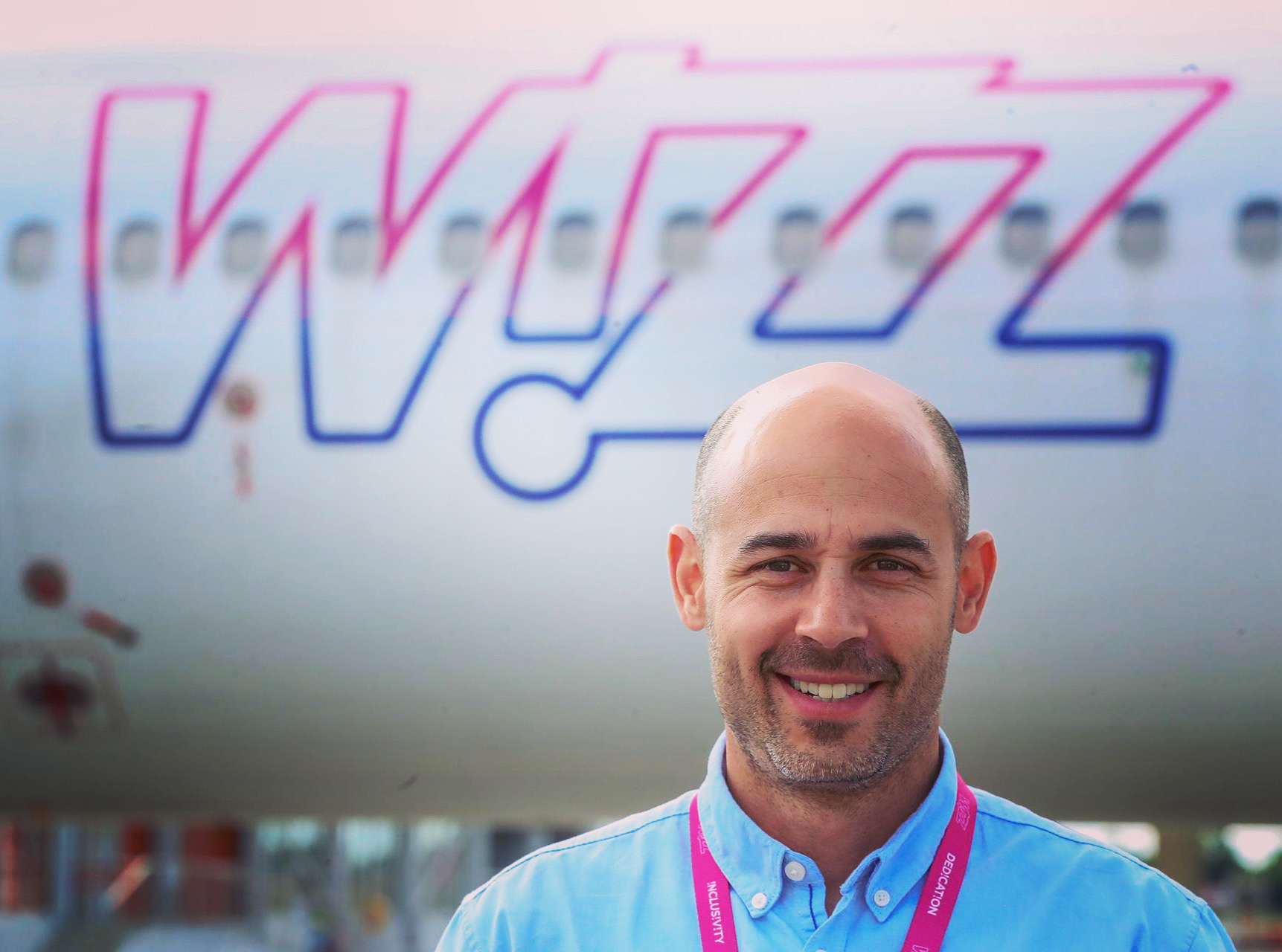Wizz Air Eyes Markets Even Further Afield

András Radó
With airlines globally eager to rebuild their markets post-COVID, how does Hungary’s low-cost champion see the future? The Budapest Business Journal talks to András Radó, senior communications director of Wizz Air.
BBJ: As with all airlines, the COVID pandemic was a disaster. Wizz Air won some traffic from the Hungarian government bringing medical goods from China; maybe you got some similar freight work elsewhere. Could you give a summary of how the coronavirus ruined your business? And how many employees did you have to lay off because of the downturn?
András Radó: Wizz Air wasn’t immune to the crisis, and on the worst day of the pandemic, the airline only operated 3% of its entire capacity. However, due to the airline’s agility, ultra-low-cost structure, and forward-thinking, it operated at over 80% of its capacity during the summer peak of 2020. Wizz Air expects to operate a similar or higher capacity of its flights this summer than last year. Wizz had to lay off 19% of our employees in 2020 but started a strong recruitment campaign in 2021 to make sure it can offer as many flights to its customers as possible.
BBJ: I’m sure there are a lot of pre-planning issues involved in the restart. I can imagine, for example, that if pilots and cabin crew don’t work an airplane type for, say, six months, they have to do refresher courses. And I’m sure you can’t just park a plane, leave it outside for 12 months, then restart it one morning and fly off on a 5,000 km tour of duty. Could you outline some of the “hidden” issues (and costs) of preparing for the restart?
AR: The aviation industry is one of the most regulated industries [globally], where safety is the top priority. The safety of the passengers, crews, and aircraft. Pilots and cabin crews had to participate in recurrent training courses, and those who did not fly for a long period of time had to take part in training courses, which are mandatory by law, and there is no exception to them.
Wizz Air has a state-of-the-art training center in Budapest, where all crews are trained and examined. Courses might last as long as six weeks, so the airline needed to be mindful to make sure that, by the time there is significant demand, Wizz Air is ready to meet it and fly passengers to their destinations. There is also a strict maintenance protocol for parked aircraft. The airline worked closely with Airbus and our maintenance partners to make sure that our aircraft were always parked properly and kept under safe and controlled environments. Knowing that the situation would require extra care and attention, we began taking our aircraft out of parking before we really needed them commercially to start the processes early. Further, Wizz Air has decided to not only perform all Airbus recommendations but has also implemented extra measures during and after parking to keep our fleet in healthy condition.
BBJ: Looking at your press releases, you seem very optimistic in terms of restarting. Could you outline your “best realistic scenarios” for traffic developments over the next 12 months? Could you say, for example, how many employees you currently have and how many you expect to have this time next year? How many planes today, and what you expect in 12 months?
AR: Wizz Air is optimistic and confident that it will be the structural winner of this pandemic. Besides managing the current situation, the airline is preparing for the post-COVID world. The airline currently has over 4,000 employees and a 15% larger fleet (141 aircraft) than at the beginning of the pandemic. We continue to take aircraft deliveries from the Airbus factory and grow our fleet to be able to offer more travel options.
Although it highly depends on the restrictions imposed by the different states, we hope that we’ll be able to operate 100% of our capacity next summer. This also will mean that we’ll have significantly more colleagues since 100% of our 2022 capacity will be higher than our current one.
BBJ: Your answer begs the question, how many is “significantly more” colleagues, and how much higher capacity are you planning in 2022 versus 2021?
AR: Wizz Air plans to take delivery of more than 20 aircraft by the summer of 2022, which also means that we should have approximately 600 more crew members than today.
BBJ: You have jumped on some of the opportunities that have opened up in the past 18 months, despite COVID. For example, you now fly from Abu Dhabi to a variety of destinations, including even Israel. Such routes are (or were) outside the “classical” Wizz Air routes, which focused on flying from Central Europe to western Europe. Is the next stage to be Pakistan, India, and Sri Lanka? Or the former Soviet Republics? And if so, what routes?
AR: The airline will need to allocate its capacity growth (as it has in the past 17 years) and, therefore, Wizz Air remains open to starting brand new routes. From Abu Dhabi, the airline can reach five billion people within an eight-hour radius, so there are a number of opportunities to grow the network. With the arrival of the A321neo XLR aircraft, there will be further opportunities to connect the furthest dots in the current network and/or add new stations and new routes to Wizz’s network. We’ll announce any plans in due course.
BBJ: The A321neo XLR has a range of 4,700 nautical miles (8,700 km), according to the Airbus website. How many of these airplanes does Wizz have on order, and for when?
AR: Twenty planes as per our current order book and deliveries will start in 2023.
BBJ: The United Kingdom was a very important market for Wizz. As I remember, London was the single most important destination for the airline. With Brexit, do you expect to see less passenger demand from Hungary, Poland, and Romania, if guest-worker numbers are dropping?
AR: Wizz Air does not expect less demand for its U.K. routes; on the contrary, Wizz Air U.K. has established three new bases in the United Kingdom over the past 18 months (London Gatwick, Doncaster Sheffield, and Cardiff). The airline remains dedicated to the U.K. and to developing its offer from the country.
BBJ: Do you expect London to remain your number one traffic generator post-COVID, at least in the next two to three years?
AR: The U.K. will remain a stronghold for Wizz Air, but there are other big and important markets in the Wizz Air network, such as Italy. Abu Dhabi also has huge growth potential.
This article was first published in the Budapest Business Journal print issue of July 16, 2021.
SUPPORT THE BUDAPEST BUSINESS JOURNAL
Producing journalism that is worthy of the name is a costly business. For 27 years, the publishers, editors and reporters of the Budapest Business Journal have striven to bring you business news that works, information that you can trust, that is factual, accurate and presented without fear or favor.
Newspaper organizations across the globe have struggled to find a business model that allows them to continue to excel, without compromising their ability to perform. Most recently, some have experimented with the idea of involving their most important stakeholders, their readers.
We would like to offer that same opportunity to our readers. We would like to invite you to help us deliver the quality business journalism you require. Hit our Support the BBJ button and you can choose the how much and how often you send us your contributions.








